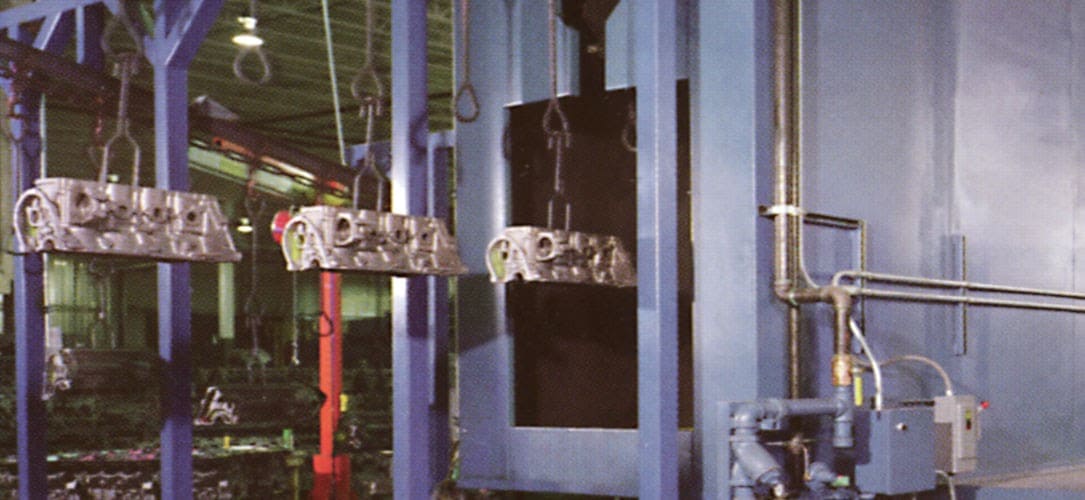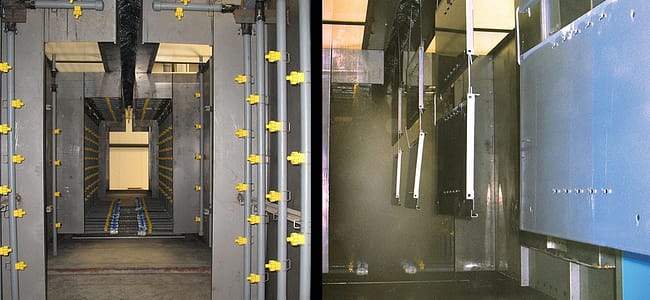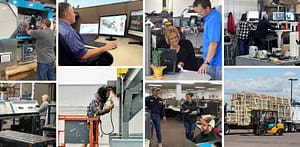
Before metal parts can be powder coated or sprayed with liquid paint, they have to be washed to remove all contaminants. One of the most efficient and cost-effective ways for manufacturers to clean parts is by using industrial pretreatment washers.
Industrial pretreatment washers are essential to ensuring powder or paint adheres properly to parts. They also lay the groundwork for consistent, quality finishes, and prevent corrosion from forming on parts.
When metal products are manufactured or transported, they are often covered in grease, oils or dirt. In order for powder or paint to adhere to a product, it must be washed to remove the contaminants. Otherwise, a majority of powder or paint that is sprayed will not stick to the product. Even if powder or paint does adhere, it will likely stick unevenly (better adhesion in clean areas and worse in soiled areas) and the finish quality will be less than ideal.
Industrial pretreatment washers are most commonly used before powder coating applications. Most industrial manufacturers outsource their powder coating to “job shops.” For instance, fence installation companies usually do not have the capacity to bring powder coating in-house. So, their fences are taken to a job shop, where they need to be chemically treated in a washer before being powder coated. Job shops must have the capability to clean and coat a variety of parts and products — the more they can get through their shop, the more they can profit.
“It doesn’t matter what you are manufacturing. It could be pencils. If you need to make 10,000 pencils a day instead of 1,000 pencils, there is a difference in how you invest your money,” said Royce Day, industrial territory manager for Global Finishing Solutions (GFS). “It all comes down to capital investment. The equipment has to pay for itself in the long run to justify the capital expense.”
Industrial pretreatment washers are similar to a car wash — products pass through multi-stage washers on a conveyor before being dried in a recirculating air blow-off system. The number of stages in the washer depends on the finish specifications of the parts being treated.

For the standard multi-stage washer, a chemical cleaning stage is followed by water and rinse stages. Complex multi-stage washers — some contain as many as seven stages — may also include phosphate stages, additional rinse stages and reverse osmosis or surfactant final rinse stages. Similar to a collision repair center designing a paint booth big enough to house the largest vehicle they plan on refinishing, a manufacturer or job shop must ensure their industrial washer is constructed with enough stages to handle the most complex pretreatment requirements.
The composition of the material dictates how parts are treated, as aluminum and steel react differently to different chemicals. Chemical suppliers specify how to use their chemicals, and based on those recommendations, operators of industrial pretreatment washers can determine:
For manufacturers that perform their own washing without an industrial pretreatment washer, the most common approach is to install a drain in the floor of an open face paint booth, then pressure wash parts in the booth. Afterward, parts are taken to a low-temperature oven, where recirculating air movement and temperatures between 110 and 180 degrees Fahrenheit rapidly dry the parts.

Without an industrial pretreatment washer, additional labor is required to manually wash the parts. Manual washing has several other drawbacks, most notably:
“One of the biggest disadvantages of manual washing is the unregulated quality control,” Day said. “You could have one worker who is really good at spraying parts and another worker who is not. And the difference would not show up until after you have applied powder or paint on those parts.”
GFS is experienced at designing and building high-quality industrial pretreatment washers that are custom engineered to meet your business’ needs, as stand-alone units or as part of a complete finishing system. An industrial pretreatment washer can go a long way for your business to ensure proper paint or powder adhesion, increase consistency in finish quality and keep your production running smoothly.
One of the best ways to highlight your business is through a story that you can share across your online platforms. It humanizes your business and shows that your business can make a meaningful impact. Your testimonial would be used as a project profile on the GFS Booth Blog and can be shared on your website and/or social media channels.
Complete this form and we’ll be in touch to showcase your company.

Shop a variety of GFS aftermarket products, including booth protection products and mobile accelerated curing units. And enjoy the convenience of fast and free ground shipping throughout the contiguous United States.

Located at GFS’ headquarters in Osseo, Wisconsin, the Center for Excellence is an innovative facility featuring an automotive refinish training center, as well as a separate space dedicated to technical product training.

GFS is continuously searching for talented, ambitious individuals to join our team. We aim to provide our employees with every opportunity to make an impact on the company and find their niche along the way — weather in a production, field services or an office position.